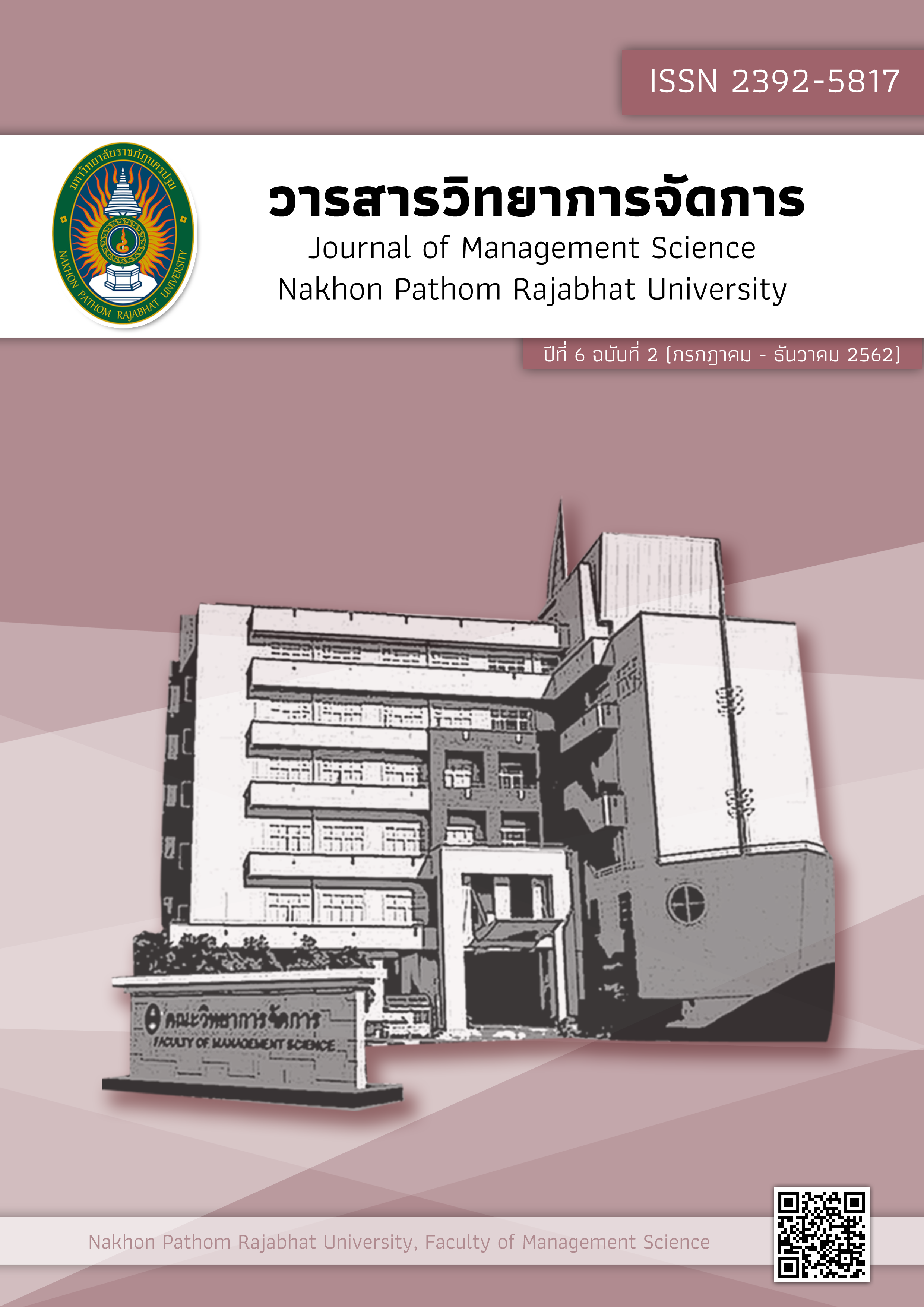Factors Influencing the Selection of Accounting Policies Regarding Revenue Recognition of Real Estate for Non - Publicly Accountable Entities
Main Article Content
Abstract
This paper aims to study factors influencing the selection of accounting policies regarding revenue recognition of real estate for non-publicly accountable entities. The main informant of this study is personnel in the real estate businesses in Phra Nakhon Sri Ayutthaya Province. This study is a qualitative research. Data were collect by in-depth interviews with 18 executives and accounting managers. The theme analysis approach was use as a tool to analyze the main issues by specificity regarding the expected factor influencing the accounting policy selection. In addition, the triangulation method is used in data collection methods. By using different sources to collect data from 1) real estate (NPAEs) 2) interview providers and 3) financial statements
The results of this study revealed that (1) internal factors affecting the selection of accounting policies regarding revenue recognition of real estate for non-publicly accountable entities included the attitude of the executives towards tax planning and targeted business performance. (2) external factors affecting the selection of accounting policies regarding revenue recognition of the real estate for non-publicly accountable entities consisting of economy, politics, society, competitors, laws and regulations. (3) revenue recognition of installment amount on due, revenue recognition methods by percentage of job completion directly affecting a difference between production cost and profit. These factors significantly influenced financial information, and were involved in the decision to select the accounting policies.
Choosing an appropriate accounting policy contributes to the accuracy of financial analysis of the real estate for non-publicly accountable entities. Therefore, management should select an appropriate revenue recognition method and apply them consistently. In addition, the government agencies should develop or promote an appropriate tax-planning notion for non-publicly accountable entities for maximizing the organization’s benefits.
Article history : Received 2 May 2019
Revised 31 May 2019
Accepted 5 June 2019
SIMILARITY INDEX = 0.00
Article Details
The views and opinions of the article appearing in this journal are those of the author. It is not considered a view and responsibility of the editorial staff.
References
ชญาณินทร์ อักษรสิทธิ์. (2552). การวิเคราะห์เชิงกลยุทธ์การผลิตและการส่งออกยางพาราของไทย. วิทยานิพนธ์ สารนิพนธ์ปริญญามหาบัณฑิต สาขาเศรฐศาสตร์ มหาวิทยาลัยรามคำแหง.
ธนิตพงศ์ ไตรพัฒน์พัชร. (2552). การวิเคราะห์เชิงกลยุทธ์การผลิตและการส่งออก ยางพาราของไทย. วิทยานิพนธ์ สารนิพนธ์ปริญญามหาบัณฑิต สาขาเศรษฐศาสตร์ มหาวิทยาลัยศิลปากร.
พนิต ธีรภาพวงศ์ (2550). ภาษีบริษัทข้ามชาติ. (พิมพ์ครั้งที่ 2).กรุงเทพฯ : วิญญูชน
พัชรา กลิ่นชวนชื่น. (2560). รายงานภาวะอุตสาหกรรมรายไตรมาส ตลาดที่อยู่อาศัยกรุงเทพฯและปริมณฑล ไตรมาส 2/2560 : ธนาคารกรุงศรีอยุธยา.
สภาวิชาชีพบัญชีในพระบรมราชูปถัมภ์. (2554 ). มาตรฐานการบัญชีเรื่องการรายงานทางการเงินสำหรับกิจการที่ไม่มีส่วนได้เสียสาธารณะ (Non-Publicly Accountable Entities : NPAEs). ประกาศราชกิจจานุเบกษาเมื่อวันที่ 6 พฤษภาคม 2554. [ออนไลน์]. ค้นเมื่อ 25 ธันวาคม 2561 จาก https://www.fap.or.th
สภาวิชาชีพบัญชีในพระบรมราชูปถัมภ์. (ปรับปรุง 2560 ก). มาตรฐานการบัญชีฉบับที่ 1 เรื่องการนำเสนองบการเงิน. ประกาศสภาวิชาชีพบัญชี ฉบับปรับปรุง 2560.
สภาวิชาชีพบัญชีในพระบรมราชูปถัมภ์. (ปรับปรุง 2560 ข). มาตรฐานการบัญชีฉบับที่ 8 เรื่อง นโยบายการบัญชี การเปลี่ยนแปลงประมาณการทางการบัญชีและข้อผิดพลาด. ประกาศสภาวิชาชีพบัญชี ฉบับปรับปรุง 2560.
สุเทพ พงษ์พิทักษ์. (2549). แนวทางการวางแผนภาษีเงินได้นิติบุคคล.(พิมพ์ครั้งที่ 2). กรุงเทพฯ : วิญญูชน
Holthausen and Leftwich. (1983).The Economic Consequences of Accounting Choice, Implications of Costly Contracting and Monitoring. Journal of Accounting and Economics, 5 (1). 77-117.
Schilit, Perler, and Engelhart. (2018). Financial Shenanigans. (4th ed.). McGraw-Hill Education.


